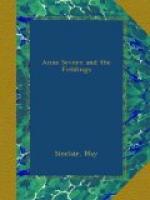Supposing it were true that they—
He couldn’t bear it to be true; his mind struggled against the truth of it, but if it were true he didn’t blame them. So far from being untrue or even improbable, it seemed to Jerrold the most likely thing in the world to have happened. It had happened to so many people since the war that he couldn’t deny its likelihood. There was only one thing that could have made it impossible—if Anne had cared for him. And what reason had he to suppose she cared? After six years? After he had told her he was trying to get away from her? He had got away; and he saw a sort of dreadful justice in the event that made it useless for him to come back. If anybody was to blame it was himself. Himself and Queenie, that horrible girl Colin had married.
When he asked himself whether it was the sort of thing that Anne would be likely to do he thought: Why not, if she loved him, if she wanted to make him happy? How could he tell what Anne would or would not do? She had said long ago that he couldn’t, that she might do anything.
They spent the evening talking, by fits and starts, with long silences in between. They talked about the things that happened before the war, before Colin’s marriage, the things they had done together. They talked about the farm and Anne’s work, about Barker and Curtis and Ballinger, about Mrs. Sutton who watched them from her house across the road.
Mrs. Sutton had once been Colin’s nurse up at the Manor: she had married old Sutton after his first wife’s death; old Sutton who wouldn’t die and let Anne have his farm. And now she watched them as if she were afraid of what they might do next.
“Poor old Nanna,” Jerrold said.
“Goodness knows what she thinks of us,” said Anne.
“It doesn’t matter what she thinks,” said Colin.
And they laughed; they laughed; and Jerrold was not quite sure, yet.
But before the night was over he thought he was.
They had given him the little room in the gable. It led out of Colin’s room. And there on the chimneypiece he saw an old photograph of himself at the age of thirteen, holding a puppy in his arms. He had given it to Anne on the last day of the midsummer holidays, nineteen hundred. Also he found a pair of Anne’s slippers under the bed, and, caught in a crack of the dressing-table, one long black hair. This room leading out of Colin’s was Anne’s room.
And Colin called out to him, “Do you mind leaving
the door open, Jerry?
I can’t sleep if it’s shut.”
v
It was Jerrold’s second day. He and Anne climbed the steep beech walk to the top of the hillock and sat there under the trees. Up the fields on the opposite rise they could see the grey walls and gables of the Manor, and beside it their other beech ring at the top of the last field.
They were silent for a while. He was intensely aware of her as she turned her head round, slowly, to look at him, straight and full.




